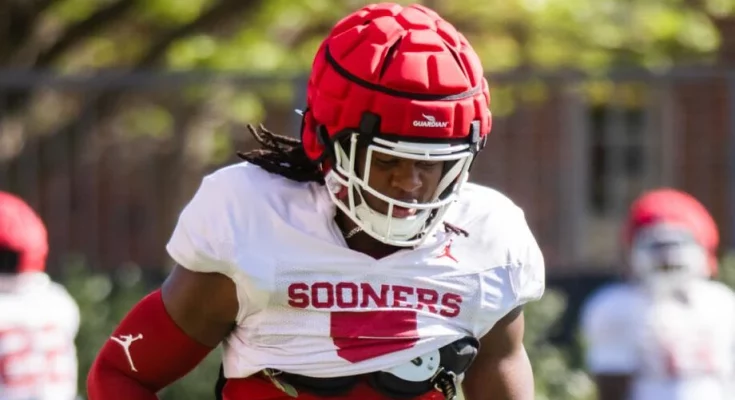**Redshirt senior linebacker Kendal Daniels, a transfer from Oklahoma State University, was worried how his teammates would react to him. The transition to a new program was daunting, not just because of the unfamiliar playbook or the different coaching style, but because of the unspoken question lingering in the air: Would he be accepted? College football is as much about brotherhood as it is about competition, and stepping into a new locker room as a veteran player carried its own set of challenges. Would he be seen as an outsider, a mercenary brought in to take someone else’s spot? Or would he find a way to earn their trust and become part of the family?**
Daniels had spent four years at Oklahoma State, grinding through injuries, learning the system, and proving himself on the field. But when the opportunity arose for a fresh start—a chance to play in a defense that better suited his skills—he took it. Now, standing in a new weight room, surrounded by unfamiliar faces, he felt the weight of uncertainty. The first few days were awkward. Introductions were polite but reserved. Players sized him up, not just as an athlete, but as a person. Would he fit in? Would he disrupt the chemistry they had spent years building?
Then came the first team meeting. The defensive coordinator called him up to break down film, putting him on the spot in front of the entire unit. It was a test. Daniels took a deep breath and began dissecting plays, pointing out adjustments, and offering insights from his experience. He wasn’t trying to show off—just to contribute. Slowly, he saw nods of approval. A few guys leaned in, asking questions. By the end of the session, the tension had eased. He wasn’t just the new guy anymore; he was someone who could help them win.
But trust isn’t built in meeting rooms. It’s forged on the field, in the grueling heat of summer workouts, in the way a player responds when his body is screaming to quit. Daniels knew that. So when conditioning drills began, he pushed himself harder than anyone expected. He didn’t complain. He didn’t cut corners. And when a freshman linebacker struggled during a drill, Daniels was the first to pull him aside, offering advice. That moment didn’t go unnoticed. Veterans started talking to him more. Younger players sought him out. The coaches began using him as an example.
By the time preseason camp rolled around, Daniels was no longer an outsider. He was a leader. When the starting linebacker went down with an injury, the team didn’t panic—they turned to him. And in the season opener, with the game on the line, it was Daniels who made the game-sealing tackle. As his teammates mobbed him, he realized something: he wasn’t just accepted. He belonged.
Transfers are becoming more common in college football, but the human element remains the same. It’s not just about talent or scheme fit—it’s about finding your place. For Kendal Daniels, that meant proving himself not just as a player, but as a teammate. And in the end, that’s what mattered most.
—
The landscape of college football has shifted dramatically in recent years, with the transfer portal reshaping rosters overnight. Players move for better opportunities, for playing time, for a fresh start. But behind every transfer is a story—a person navigating the complexities of change, adaptation, and acceptance. Daniels’ journey is just one of many, but it highlights a truth often overlooked in the business of sports: talent opens doors, but character determines whether you stay inside.
When Daniels entered the portal, he had options. Several Power Five programs reached out, intrigued by his size, speed, and experience. But he wasn’t just looking for a place to play; he was looking for a place where he could matter. That’s why he chose his new school. The coaches sold him on a vision—not just of his role on defense, but of his potential impact in the locker room. They needed leaders. And Daniels, despite being new, had the traits of one.
Still, knowing you can lead and actually leading are two different things. The first test came during player-led workouts. Without coaches present, the team’s dynamics were laid bare. Some guys took charge. Others followed. Daniels didn’t force his way into the conversation, but when he spoke, his voice carried weight. He had been through battles at Oklahoma State—big games, tough losses—and that experience resonated. Younger players listened. Even the seniors respected his perspective.
Then came the real challenge: earning the trust of the defensive line. Linebackers and defensive linemen have a symbiotic relationship. If the line doesn’t trust the linebacker to fill the right gaps, the entire defense collapses. Early in camp, Daniels misread a play, leading to a big run. The defensive tackle, a fifth-year senior, shot him a look. No words were needed. Daniels approached him after practice. “That’s on me,” he said. “Won’t happen again.” The defensive tackle nodded. From that moment on, they worked in sync.
Off the field, Daniels made a conscious effort to connect with his teammates. He joined them for meals, attended other sports games to show support, and even participated in a team talent show—something he would’ve never done at his previous school. It was those small moments, the ones that had nothing to do with football, that solidified his place in the team’s fabric.
By midseason, Daniels was one of the defense’s most vocal leaders. When a freshman made a mistake, he was the first to encourage them. When energy lagged during practice, he was the one rallying the group. And when the team faced adversity—a heartbreaking loss that could’ve derailed their season—he stood in front of the locker room and reminded them who they were.
The transfer portal is often criticized for creating a free-agent mentality in college football. But for players like Kendal Daniels, it’s not about chasing the spotlight. It’s about finding a home. His story isn’t unique. Across the country, transfers are proving that fitting in isn’t about how long you’ve been somewhere—it’s about what you bring when you get there.
In the end, Daniels’ worries about acceptance faded not because of his tackles or his stats, but because of the relationships he built. Football is a team sport, after all. And no matter where you come from, being a teammate is what truly matters.



